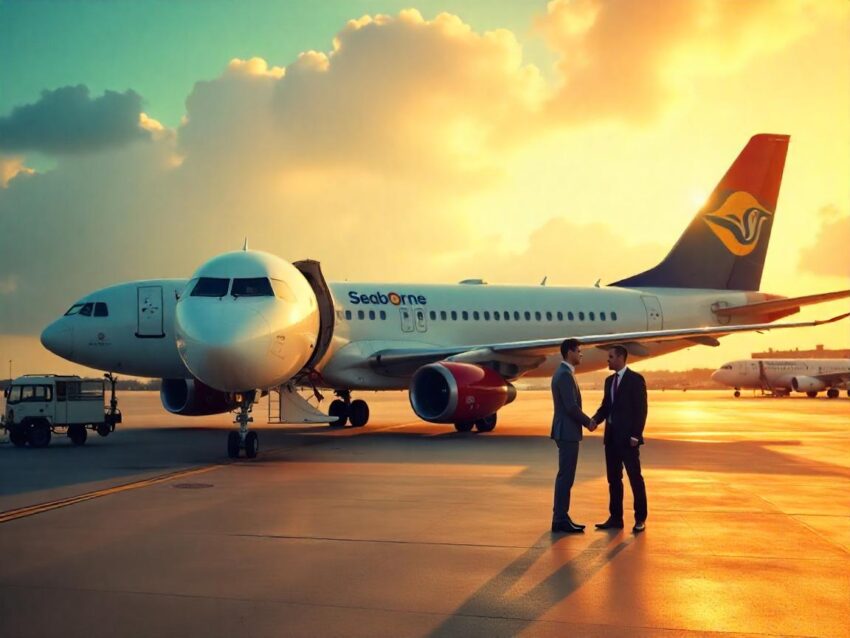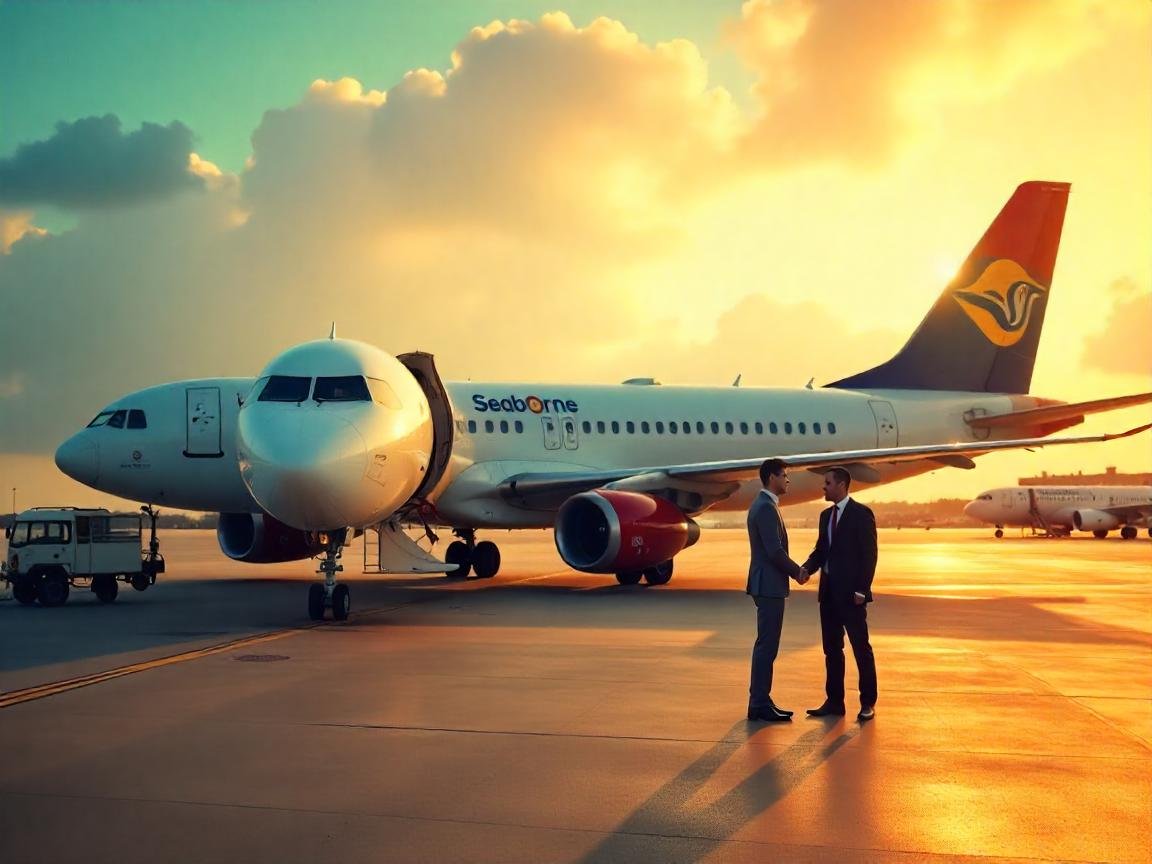Monday, June 23, 2025

A Brazilian low cost airline has just shaken the skies with a surprise bid that no one saw coming. The target? Bankrupt US carrier Seaborne. This unexpected high-stakes takeover move is creating waves across the aviation industry. Why would a South American budget airline dive into a distressed U.S. regional carrier? And more importantly—how will it get past strict foreign ownership rules? The latest news has insiders buzzing. Stakes are high. Rules are tight. But ambition is sky-high. If successful, this bold maneuver could shift how global airlines approach U.S. airspace. Industry veterans are watching. Regulators are preparing. Travelers? They’re left wondering what this could mean for future fares and routes. Could this be the most daring aviation play of the year? Or will legal turbulence ground it before takeoff? The answers are unfolding fast—keep reading to find out what’s really happening behind this headline-making deal.
Brazilian Airline’s Strategic Play to Acquire U.S. Carrier Seaborne Ignites Debate Over Foreign Ownership in American Skies
In a bold move that’s rattling the aviation world, a Brazilian low-cost airline has launched a bid to acquire Seaborne Airlines, a U.S. carrier currently operating under Silver Airways’ umbrella. The plan, while ambitious, instantly collides with one of the most rigid rules in American aviation: foreign ownership restrictions.
According to U.S. law, no more than 25% of a U.S. airline’s voting stock can be held by foreign entities, and operational control must remain firmly in American hands. But that hasn’t stopped the Brazilian bidder. Instead, they’ve mapped out a carefully structured strategy to maneuver within the letter of the law while still pursuing what could be a transformative acquisition.
Behind the Bid: Why Seaborne Matters
Seaborne Airlines, based in San Juan, Puerto Rico, is best known for its Caribbean routes, acting as a regional connector to island destinations underserved by major carriers. Its parent company, Silver Airways, has faced financial strain, and Seaborne itself has flirted with bankruptcy.
For the Brazilian airline, this isn’t just a bargain grab—it’s a strategic expansion into U.S. markets through a smaller, struggling airline with an existing FAA operating certificate. With that certificate comes access to U.S. skies, something foreign airlines are normally barred from unless they navigate an intricate web of regulatory compliance.
The Legal Workaround: How the Deal Could Fly
To comply with U.S. Department of Transportation (DOT) rules, the Brazilian buyer must distance itself from direct control. That means the voting rights associated with Seaborne’s shares would be transferred to an American trustee or affiliate.
Moreover, Seaborne’s leadership must remain predominantly American. The front-facing management team and decision-making power must reflect U.S. nationality, even if the financial backing comes from abroad.
This legal gymnastics isn’t new. In the past, similar structures have been used to get international money into American skies—often through carefully drafted contracts that satisfy both legal and operational boundaries. But even with these safeguards, federal regulators will be watching closely.
A Lesson from Virgin America: The Fred Reid Precedent
This situation echoes the early days of Virgin America. When it launched, former Delta executive Fred Reid—an American citizen—was tapped to lead the company. But despite Reid’s nationality, the DOT took issue with his employment contract, arguing that it gave too much power to Virgin Atlantic, a foreign airline. As a result, Reid was forced to step down before Virgin America could launch.
The precedent is clear: it’s not just about who holds the title. It’s about who’s really in control. And that’s where the Brazilian airline’s bid could face turbulence if regulators find any signs of backdoor influence.
American Samoa and the Quirky DOT Loophole
Oddly enough, the complexities of U.S. airline regulation don’t stop at foreign takeovers. Even U.S. territories face roadblocks under these laws. In American Samoa, where most residents are U.S. nationals but not full citizens, a locally-owned airline can’t legally fly outside the territory without DOT intervention.
Every six months, the DOT must issue an emergency waiver just so these carriers can keep operating. It’s a stunning example of how deeply rooted—and rigid—America’s aviation protectionism really is.
What This Means for Travel and the Market
If the acquisition goes through, Seaborne could experience a much-needed turnaround. Fresh capital, new routes, and stronger branding could breathe life into its operations and improve connectivity in the Caribbean.
But more importantly, the deal could open the door to broader changes in how foreign investments are handled in U.S. aviation. It may trigger new conversations about revising outdated policies—especially as global airlines continue seeking strategic partnerships and market access through indirect channels.
For American travelers, it could mean more choices, better fares, and new regional links. For regulators, it’s a tightrope walk between welcoming investment and guarding against foreign dominance.
A Broader Trend in Global Aviation Strategy
This isn’t an isolated play. Airlines worldwide are increasingly using mergers, investments, and legal loopholes to gain access to restricted markets. With rising fuel costs, shifting demand, and post-pandemic consolidation trends, the pressure to innovate is greater than ever.
The Brazilian airline’s move is just one example of how carriers are adapting to global rules while pushing boundaries. If successful, the deal could set a new precedent for international airline expansion into U.S. territories—particularly through struggling regional operators with valuable route authorities.
The Road Ahead: DOT Will Decide the Flight Path
Ultimately, the U.S. Department of Transportation holds the final say. The review process will examine not just paperwork but also the substance of control. Who is really running the airline? Who calls the shots? And who benefits from the revenue?
If the Brazilian airline can convincingly demonstrate that its role is financial, not operational, it may clear the regulatory hurdles. But the spotlight is now on, and every detail will matter.
For now, the travel industry watches and waits. Will this bid redefine what foreign ownership means in U.S. skies? Or will regulators step in to clip its wings?
One thing is certain: this isn’t just a business transaction. It’s a high-stakes legal and political chess match with long-term implications for aviation law and global travel strategy.
Tags: airline mergers, airline strategy, American Samoa, aviation law, brazil, caribbean, caribbean tourism, FAA compliance, foreign ownership restrictions, international aviation policy, puerto rico, Regional Airlines, san juan, Seaborne Airlines, Silver Airways, U.S. Department of Transportation, United States, Virgin America

